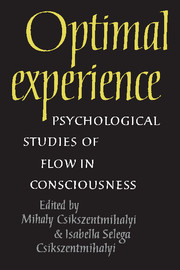Book contents
- Frontmatter
- Contents
- Acknowledgments
- Contributors
- I A THEORETICAL MODEL OF OPTIMAL EXPERIENCE
- II VARIETIES OF THE FLOW EXPERIENCE
- III FLOW AS A WAY OF LIFE
- IV THE MEASUREMENT OF FLOW IN EVERYDAY LIFE
- 15 Introduction to Part IV
- 16 The systematic assessment of flow in daily experience
- 17 The quality of experience in the flow channels: comparison of Italian and U.S. students
- 18 Flow and the quality of experience during work and leisure
- 19 Optimal experience and the uses of talent
- 20 Self-esteem and optimal experience
- 21 Optimal experience and the family context
- 22 The future of flow
- References
- Name index
- Subject index
18 - Flow and the quality of experience during work and leisure
Published online by Cambridge University Press: 05 June 2012
- Frontmatter
- Contents
- Acknowledgments
- Contributors
- I A THEORETICAL MODEL OF OPTIMAL EXPERIENCE
- II VARIETIES OF THE FLOW EXPERIENCE
- III FLOW AS A WAY OF LIFE
- IV THE MEASUREMENT OF FLOW IN EVERYDAY LIFE
- 15 Introduction to Part IV
- 16 The systematic assessment of flow in daily experience
- 17 The quality of experience in the flow channels: comparison of Italian and U.S. students
- 18 Flow and the quality of experience during work and leisure
- 19 Optimal experience and the uses of talent
- 20 Self-esteem and optimal experience
- 21 Optimal experience and the family context
- 22 The future of flow
- References
- Name index
- Subject index
Summary
In adults, flow has been described in the context of specific activities, such as chess playing, rock climbing, and surgery (Csikszentmihalyi 1975b), but not as it occurs during the course of the ordinary activities of everyday life. However, studies of teenagers during everyday life have shown that flow is characterized by higher levels of motivation, cognitive efficiency, activation, and satisfaction (Csikszentmihalyi & Larson 1984; see also Massimini & Carli, Chapter 16; Carli, Delle Fave, & Massimini, Chapter 17). Furthermore, high as opposed to low achievers report a greater proportion of flow during academic work (Csikszentmihalyi & Nakamura 1986; Nakamura, Chapter 19). These findings with teenagers suggest that flow during everyday life is an optimal experience that facilitates the fulfillment of individual potential.
To confirm that the experience of flow is an optimal experience for adults as well as teenagers during everyday life, this study first describes the amount of time adults spent in flow (identified as a balanced ratio of challenges to skills above average weekly levels) and then compares self-ratings of the quality of experience with ratings given during the rest of daily life. In addition, it examines whether increased time in flow enhances the overall quality of experience.
Most adults spend a large part of their time at work. However, the quality of the working experience varies considerably. It has been proposed that well-being on and off the job relates to the opportunities for self-actualization and growth available at work, which in turn depend on the nature of the job (Herzberg 1966; Davis & Cherns 1975; Karasek 1979).
- Type
- Chapter
- Information
- Optimal ExperiencePsychological Studies of Flow in Consciousness, pp. 307 - 318Publisher: Cambridge University PressPrint publication year: 1988
- 56
- Cited by



